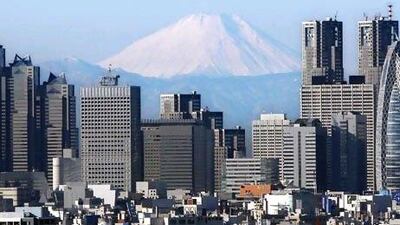It has been a couple of decades since Japan dazzled investors with the promise of juicy profits. The yield on 10-year government bonds hovers at an anaemic 1 per cent and the nation's stock market, less than a third of its value 20 years ago, has hardly budged in a year.
Yet there is one asset class, property, that is giving investors reason to take a fresh look at what is, perhaps unfairly, dismissed as a fading economic giant at the edge of the world's most dynamic economic growth region.
What Japan offers, or at least parts of it such as uptown Tokyo, are not-bad returns, and for investors making a mint in the property bubbles elsewhere such as China, a haven of stability. Although a reality that is sometimes lost in the bravado of rising prices, asset bubbles always burst. The trick to making money in them is to get in and out before the inevitable crash comes, as it did in Europe and the US a couple of years ago.
The worry for some is that China will follow this year. Short of an outright property collapse, authorities may at least try to let some air out of the balloon to stop overheating in the world's number two economy, which grew at an annual rate of 9.6 per cent in the third quarter of last year. Already mandarins in Beijing are cracking down on what they see as over exuberance. That tightening includes stricter rules on minimum down payments, making banks increase reserves against bad loans, and more recently, forcing developers to build on idle land rather than hoarding it to push up prices.
For investors, who figure it is time to get some of their money out, Japan may be one of the best ports to wait out any coming storm. Here, property bubbles are a distance memory; 1989 was the top of the market, and apart from a few small ups and downs since, property prices have not rebounded, falling in some places to a quarter of their peak.
Already-depressed prices mean less chance of a fresh property slump, while making potential returns that much more attractive. Cap rates on office buildings, which represent annual rent as a percentage of a property's price, are as high as 5 per cent in many parts of central Tokyo, according to industry analysts. Strong property laws that investors can expect courts to enforce add to the appeal of Japan's capital.
The sprawling city on the Kanto plain is still the world's largest conurbation and home to some 32 million people, or one in four Japanese. That means a thick catalogue of properties for any investor all the way from the thousands of thin, 10-storey pencil buildings raised on tiny parcels of land all the way up to sky-scraping office towers and condominiums.
A wave of distressed properties may also add to supply. During the financial crisis, Japanese lenders, property investors say, did not lean too heavily on borrowers struggling to repay loans. By foreclosing, banks would have had to sell the collateral property and book the resulting loss on their balance sheets. Government officials struggling to prop up the financial system appreciated the lenience.
In recent months, say analysts, the gap between what distressed property owners want and what investors are willing to pay has narrowed, suggesting a swell in buying and selling as the hangover from the credit crisis is finally worked through.
Foreigners hoping to tap Japan's property market include firms such as Blackstone, and even the property investment arm of the Singaporean government's Temasek Holdings. Individuals too, many of them of them Chinese, have been on the lookout for good locations in Japan. For them, condominiums and hotels, rather than office buildings, appear to be the preferred choice of property because rents do not rely on a few big clients, whose loss would make a big dent in income, but on a multitude of smaller renters.
Though Japan may seem far removed from the maelstrom of property bubbles in developing economies, international investors, both big and small, should still tread carefully. The tangibility of property, makes it, perhaps more than any other asset, a local market, were the home player, who knows the locations, the financing, the rules and the pitfalls, will always have a head start over the newcomer. So before heading to the islands on Asia's eastern fringe, it is probably a good idea first to make a few friends in Tokyo who know a few things about bricks and mortar.

